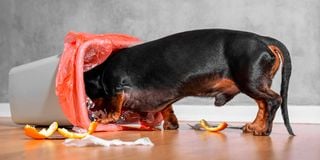Here are signs of pet dietary indiscretion and how to manage it

Pet dietary indiscretion is when your pet eats anything outside of its normal diet such as garbage, foreign objects and excrement from other animals.
Pet dietary indiscretion is when your pet eats anything outside of its normal diets such as garbage, foreign objects and excrement from other animals. This condition is not caused by anything in particular.
Some pets are more prone to this behaviour for example those that have lived as strays for a while and are used to foraging for food. It is also common in pets that are fed unusual foods or those that like to hang around trash cans at home. It is advisable for pet owners to keep garbage cans away from the pet.
Proper pet food
Diet indiscretion is also a common cause of acute gastrointestinal signs such as vomiting or diarrhoea. Pets that eat food that they should not consume may suffer from lethargy, lack of appetite, stomach pain, vomiting, diarrhoea, flatulence and dehydration. If your pets experience these symptoms for more than a day, they will most likely be unwell and hence should be taken to the vet immediately.
You can prevent diet indiscretion by giving your dog or cat proper pet food and treats only. Avoid giving them table scraps if you can afford it. Secure your garbage cans so pets do not feed on the trash and make sure they do not have access to any excrement. And most importantly, make sure your pet is always well-fed so it does not scrape for anything to survive.
Health condition
If your pet suddenly starts eating unusual things, have them checked by a vet to ascertain if they are suffering from health conditions like hyperthyroidism or diabetes. They could also be deficient in some nutrients or have mal-absorption syndrome. Dogs are more inclined to eat poop, so if you get a new cat, keep the litter box clean and out of the dog’s reach.
You can also train your pet, emphasising “leave it” and “come” commands. This way, you have control of your pet, especially the dog, from eating poop, trash or any foreign material during walks.
Maryanne is a pet owner. [email protected]





